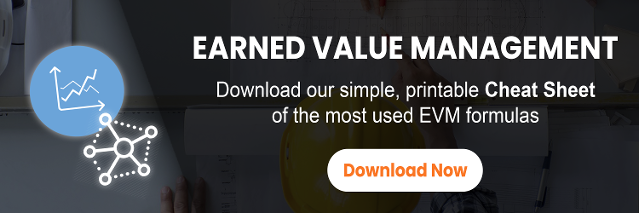Cost is one of the triple constraints in project management and one of the most important of every project. While challenging to manage and control, not impossible and there are many tools and methods out there to help you.
One of the most accepted tools is the Earned Value Management (EVM) process that can capture project health and performance easily. The process incorporates project progress, schedule and costs, so you can project and analyze how the overall project is performing.
The following paragraphs provide basic and general knowledge about EVM and how costs are controlled when the EVM gets implemented.
Earned Value Management Terms
Let’s start by defining the terms used during the process and what they mean, so you can properly understand the methodology.
- Planned Value (PV) represents the budgeted cost of the work. In Microsoft Projects and other tools, it’s also known as budgeted cost of work scheduled (BCWS). In other words, it represents the money to be spent in the project on a given task or overall project.
- Actual Costs (AC) is the cost incurred for the work already completed. It can also be known as actual cost of work performed (ACWP).
- Earned Value (EV) is the total budget of work completed at any given time. In Microsoft Project and other software, it’s known as budgeted cost of work performed (BCWP).
- Cost Performance Index is the ratio representing the amount of work completed for every unit of cost spent. When greater than 1, the project is in good health and under budget. It is calculated by dividing EV/AC.
- Schedule Performance Index shows how much work has been completed compared to the baseline schedule. When it is greater than 1, the project is ahead of schedule. It is calculated by dividing EV/PV.
Using EVM is a great approach at identifying risks and understanding when a project is going to be over budget or coming at budget.
The previous terms are calculated comparing the baseline schedule and the original budget to the actual costs incurred in the project. The different ratios and tools that the EVM provide are important tools to forecast the actual cost performance and the budget at completion at any given time. The tools can also be used to determine the estimate at completion and from those numbers you can put together a plan to bring the project on track and close the actual budgeted cost.
Check out our 7 Earned Value Management Formulas To Know For Project Controls & the 70 Project Scheduling Terms That Every Planner Needs To Know article.
Benefits of Earned Value Management
The benefits of using EVM to control cost are many, but it is important because it presents an opportunity to calculate the cost on a per task or activity basis. For each activity you will know how the cost and indexes are performing. By doing this, you can direct your resources and effort to that particular level to improve its performance.
The schedule indexes and ratio are good information to have, because most of the time a project that is behind schedule might tend to add resources or increase its cost to meet the schedule. One critical index is the “to complete Performance Index”, as it provides a snapshot of how the project must perform to meet the financial goal or commitment.
The analysis is now mandatory on all federal contracts and every contractor must have a good understanding of the analysis. EVM is a good tool to prevent scope creep and helps maintain a good forecasting analysis of the project. Because it demonstrates how a project is performing, the tools will help identify risk and potential areas of concern related to cost and schedule.
The variance at completion is another component which tells you how much over or under budget will the project be once it gets completed. These ratios and indexes are beneficial to the project team and to the communication when there are problems affecting the project cost. By knowing how each activity is performing, you can free up resources that can be reallocated to other activities without affecting the overall project budget and cost – keeping the project on track.
It is very important to record accurate information about the costs and expenditure of critical activities. Do you used EV to record and control your costs?


